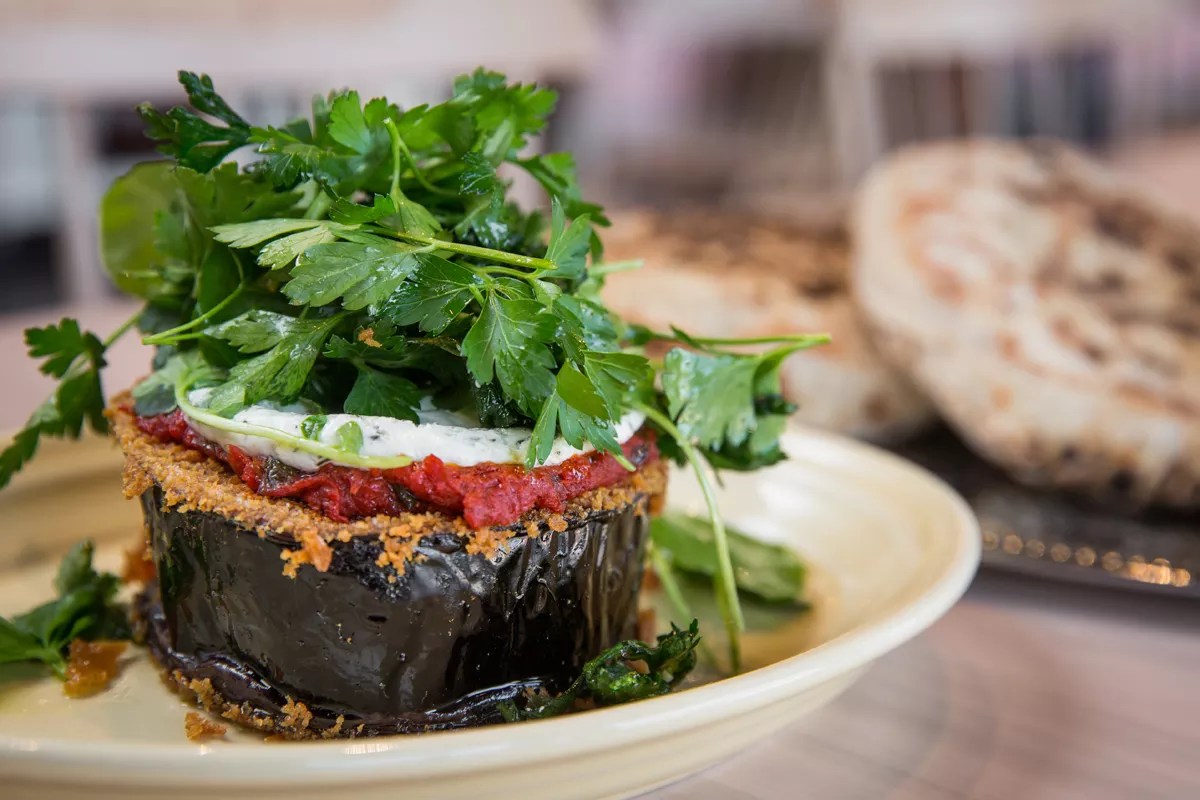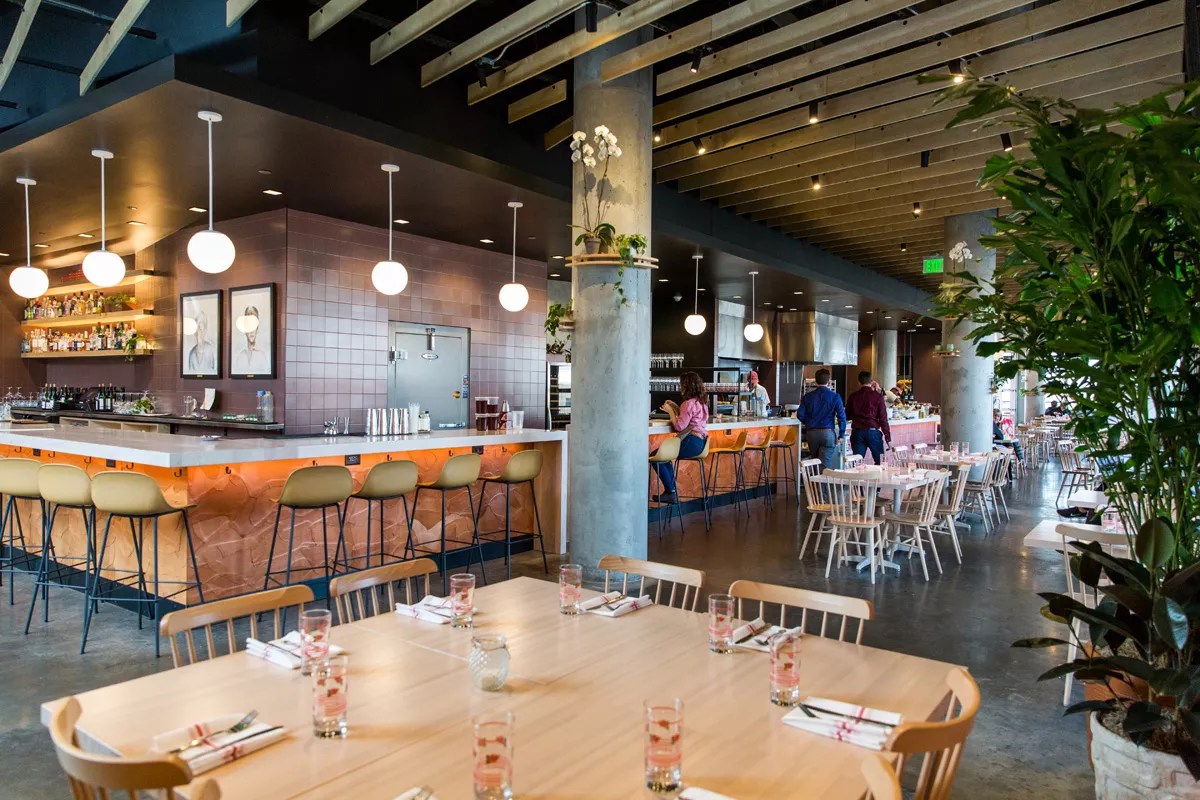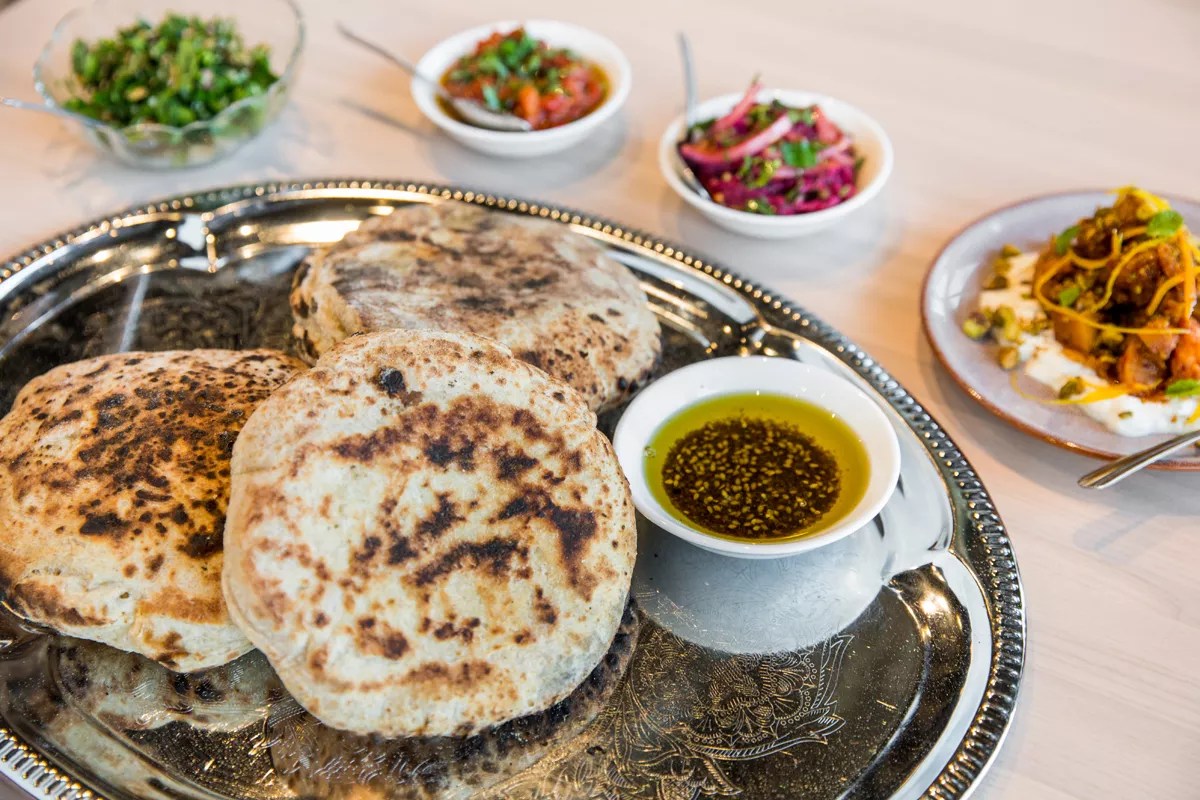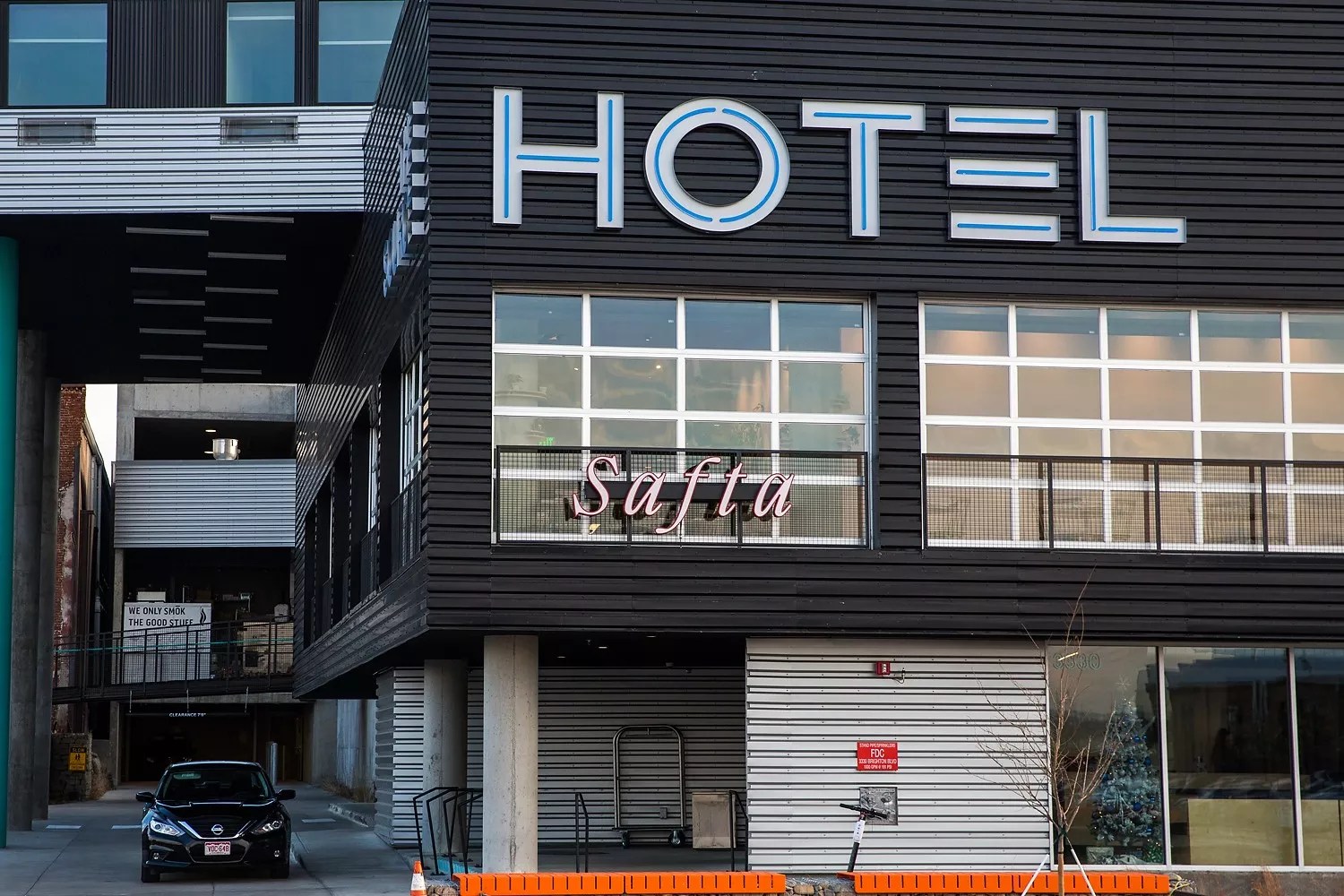
Danielle Lirette

Audio By Carbonatix
Alon Shaya has pulled in two James Beard awards, a feat as jaw-dropping as winning two straight Super Bowls or hugging the golden statuette two years in a row. So you’d think he would have gotten the memo about bread service, and how the cool kids no longer give it away. After decades of restaurants serving complimentary rolls tucked inside a napkin-lined basket, suddenly there’s cachet in charging a premium for bread with house-cultured butter or whipped lardo or jam. But if Shaya got the memo prior to opening Safta this summer, he ignored it, which seems like a bad business move for him, but good news – very, very good news – for us.
Free bread is at the heart of Safta, a contemporary Israeli restaurant on the second floor of the new Source Hotel. Pita bread, to be exact, pulled from a wood-burning oven visible from nearly every seat in the sunny dining room, which wraps around the corner of the building, allowing big-sky views through floor-to-ceiling garage doors. Made fully in-house, a process requiring numerous rises and punch-downs and plenty of resting time, each pita is placed in the searing oven by someone akin to a pizzaiolo, or Neapolitan pizza maker. Flipped quickly and whisked to your table, the pale brown bread arrives hot, puffed and slightly sour from the 100-year-old starter. Rip it open and inhale the fresh-baked-bread smell. Take a bite of the chewy, charred edges, and savor the heft of the freshly milled Turkey Red wheat. Dunk a piece in Italian extra-virgin olive oil studded with seedy za’atar and be grateful that Shaya picked Denver when he decided to expand out of New Orleans.
Now use the rest of your pita like a fork, scooping up jewel-toned salatim, an array of very small shareable sides. Perhaps slices of butternut squash and creamy stracciatella, a cousin of mozzarella, bright with orange zest. Or grated beets with pickled onions, tahini and lemony coriander seeds. Tabouleh made with a haystack of whole parsley leaves, preserved lemon and a dusting of bulgur. Deeply smoky baba ganoush. And lutenitsa, a stewed dish of eggplant, red peppers and onions that is a recipe from Shaya’s grandmother and one of the first things he learned to cook as a boy. “When I opened the front door to my house and smelled those peppers and onions, it didn’t just make me think that dinner was about to be served,” he recalls. “It was a sense of family being back together.”

Safta is located on the second floor of the Source Hotel.
Danielle Lirette
You’ll want even more pita for hummus, which warrants its own section of the menu, heaped with everything from spicy lamb ragu to curried cauliflower. Most people order their hummus topped, but it’s at its elegant best ordered plain, with just a drizzle of extra-virgin olive oil and Aleppo pepper. This hummus is as different from all the hummus you’ve had before as ramen-ya ramen is from the 39-cent stuff in Styrofoam. From the California-grown legumes (a fresher product than the usual dried, dusty chickpeas) to the meticulous preparation – involving soaking and roasting the legumes, removing the skins, then blending them with a whisper of tahini, lemon, salt, garlic and olive oil – this smooth hummus is worth every bit of its double-digit price tag. Paired with pita, you could easily make it your meal.
You’ll try not to. You will tell yourself not to eat too much, to save room. You will push the bread to the other side of the table so that your friends show mercy and eat it for you. You will even tell the kind and thoughtful server who’s offering to bring you more that, no, you’re all set. But you’ll likely be given more anyway; the staff at Safta is generous that way, channeling the hospitality of grandmothers everywhere, including Shaya’s grandmother, for whom the restaurant is named. Safta means “grandmother” in Hebrew, and a portrait of Shaya’s
grandmother hangs in the bar; a sibling restaurant, Saba – “grandfather” in Hebrew – opened last spring in New Orleans, Shaya’s longtime home base. After World War II, his safta and saba emigrated from Bulgaria to Israel, where Shaya was born, hence his passion for Israeli cuisine.

More pita, please.
Danielle Lirette
With each irresistible pita, you’re less and less likely to order what the menu calls “small plates,” which are bigger than the very small salatim but smaller than the “large plates.” That’s a shame, because there are numerous allures on this menu, which borrows from both Saba and Shaya’s eponymous New Orleans-based restaurant, singled out in 2016 by the Beard committee as the nation’s best. The following year, Shaya lost control of that restaurant and the rights to his last name in a legal battle with his former partner, the scandal-plagued John Besh, but he made a quick pivot, launching a tour for his cookbook Shaya: An Odyssey of Food: My Journey Back to Israel, then opening both Saba and Safta. Now Shaya is starting to put down roots in Denver – a place he calls his “happy trail,” which is why he accepted this offer over all the others as the right place to expand. The kitchen is run day-to-day by chef de cuisine and up-and-comer Jessica Nowicki. In addition to influencing the food coming out of that kitchen, Shaya’s grandmother inspired the decor, too, with mauve wall tiles, floral china and pink-flowered glasses, with flowers copied from one of her paintings.
Matzo ball soup is the essence of a grandma’s home-cooking, with tender matzo balls bobbing in rich duck broth with fresh parsley, cilantro and dill, the barest hint of cinnamon and the satisfying crispness of raw shaved carrots and celery. Deep-fried falafel breaks open to reveal innards bright green from lavish amounts of parsley and cilantro. Shakshouka, with Jerusalem artichokes in a hearty red-pepper-tomato sauce with rich, runny eggs, makes a satisfying wintry followup to the previous parade of cold plates. Best-in-show goes to the crispy eggplant, a cousin of eggplant parmesan. Artfully layered, it also pays homage to Shaya’s grandmother. Thick slices of globe eggplants are battered and twice-fried, a chef’s trick that makes the flesh silken and the purple skin ultra-crisp. Stacked with herbed goat cheese and tomato sauce, this is the one must-order dish outside of anything scooped up with pita.
If you’ve ignored all warnings and over-indulged, you can be forgiven for skipping the large plates and going straight to malabi, Safta’s version of panna cotta, thickened with orchid root and topped with grapefruit supremes, almonds and rosewater-scented grapefruit syrup. The pomegranate braised lamb shank might not be meaty enough to warrant the $42 price anyway, and the whole roasted cauliflower can be squishy from its butter braise, though its accent of whipped mascarpone, cream cheese and feta is sensational.
As the best chefs will tell you, the true sign of genius isn’t in complex dishes, but in the flawless execution of simple ones. While Shaya has those down cold, the restaurant proves it’s smart from the start when that free pita arrives. Grandma would approve.
Safta, 3330 Brighton Boulevard, #201, 720-408-2444, eatwithsafta.com
Hours: 11 a.m. to 2:30 p.m. and 5 to 10 p.m. Wednesday, Thursday and Sunday, 11 a.m. to 2:30 p.m. and 5 to 11 p.m. Friday and Saturday. Counter hours: 7 a.m. to 10 p.m. daily. Closed Monday and Tuesday.
Select menu items
Lamb ragu hummus $16
Salatim 5 for $35
Duck matzo ball soup $14
Shakshouka $16
Crispy eggplant $12
Whole roasted cauliflower $24
Lamb shank $42
Malabi $10

Safta in the Source Hotel.
Danielle Lirette